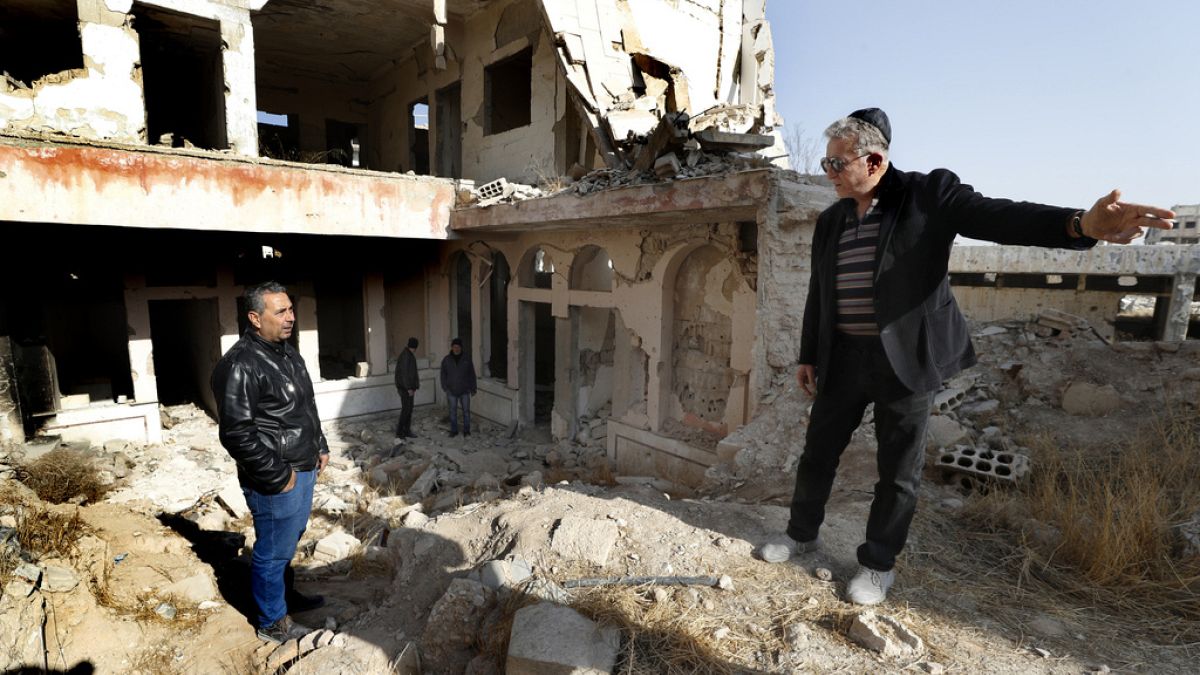After 13 years of civil war, Syria’s dwindling Jewish community can return to the Jobar Synagogue in Damascus, one of the world’s oldest, where they once gathered for prayers before the conflict left it partially destroyed.
Jobar, a Damascus suburb that was heavily bombed during the war, is now accessible again, following the overthrow of President Bashar Assad’s regime earlier in December. The Jobar Synagogue, or Eliyahu Hanavi Synagogue, is one of the few religious landmarks still standing in a region that was once home to a thriving Jewish community, dating back thousands of years.
Bakhour Chamntoub, the 74-year-old head of the Jewish community in Syria, recently visited the synagogue for the first time in 15 years.
“This synagogue means a lot to us,” he told The Associated Press, his voice heavy with emotion. Although he had heard of the damage, he was not prepared for the devastation: “I am frankly disturbed,” he said, surveying the pile of rubble where walls and roofs had collapsed, and valuable artefacts disappeared, likely looted.
Syria’s Jewish population has dramatically declined since the founding of Israel in 1948, and today only nine Jews remain in the country. Most are elderly, with the community expecting that no Jews will remain in Syria in a few years.
Chamntoub, who has spent his life in Syria, is among the few who openly maintain their faith in a country where anti-Israel sentiment often makes such openness dangerous. “I never faced discrimination,” he remarked, however, explaining that others keep their Jewish identity private for fear of being labelled spies or collaborators.
The Jobar Synagogue was once a centre of Jewish life in Damascus, where Chamntoub and his community prayed on Saturdays, a practice disrupted by the war. The synagogue’s destruction is a painful reminder of the community’s fragility. “It was a beautiful religious place,” said Barakat Hazroumi, a Muslim who lived nearby, recalling how he would assist Jewish worshippers by lighting candles on the Sabbath.
The Jewish community in Syria has a history spanning nearly 3,000 years, beginning with the prophet Elijah’s time in Damascus. After the First Crusade in 1099, around 50,000 Jews fled Jerusalem and settled in Damascus, forming a significant portion of the city’s population.
Later, Jews arrived from Europe, escaping the Spanish Inquisition. By the early 20th century, Syria’s Jewish population numbered about 100,000. Following the creation of Israel tensions rose and many Jews emigrated, particularly in the post-1948 period.
Under the Assad regime, Jews were allowed to practice their faith, but travel restrictions were imposed to prevent emigration, particularly to Israel. These restrictions eased in the early 1990s leading to further emigration.
In the aftermath of the war, there is hope for the rebuilding of the synagogue and the wider Jewish quarter of Damascus, which has largely been abandoned. But with the community shrinking, Chamntoub now marks the Jewish festival of Hanukkah alone at home, cooking vegetarian meals and receiving parcels of kosher meat from family abroad.
“I am a Jew and I am proud of it,” he said, expressing hope that with the fall of Assad, Syrians will enjoy more freedoms, economic and otherwise.
Checkout latest world news below links :
World News || Latest News || U.S. News
The post Syria’s last Jews can return to one of the world’s oldest synagogues appeared first on WorldNewsEra.

